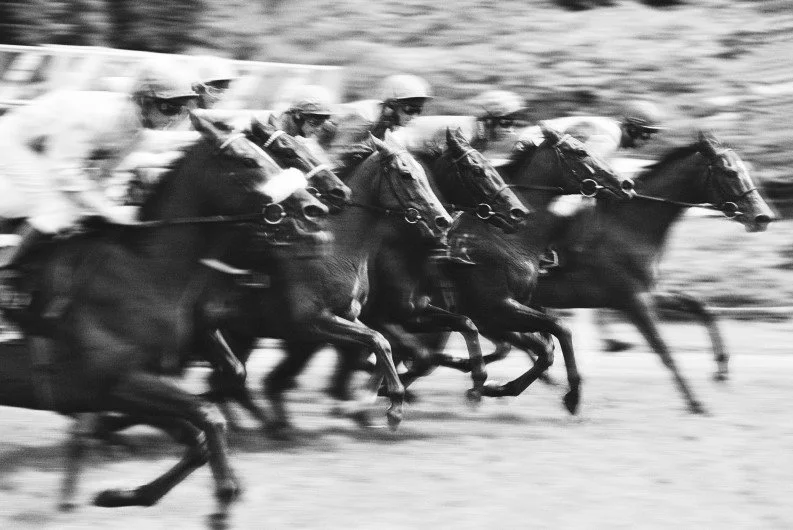Periodical
JUNE
2025
Rolf Johnson
A Weight off your mind – should handicapping be left to the ‘experts’?
Rolf’s Ramblings
A Weight off your mind – should handicapping be left to the ‘experts’?
Two of my best, late, official handicappers, were personal friends universally acknowledged as masters of their profession. The ‘daddy of them all’ Admiral Rous, back in 1850s, only had fields of handfuls to rate and even he said, “Every great handicap is a premium to fraud.”
One of my friends was, well, let’s leave it at ‘unorthodox’. Now that ought to be a contradiction in terms because handicapping is surely an exercise that can’t admit the irregular’. If a handicapper can’t argue that his work is axiomatic, gospel even, then what is it for? His figures, for hurdlers, constantly confounded other ‘self-styled’ experts.
The place to start any debate over handicapping has to be with the classic generation because it is their performances and the revelation of their potential for stud that the future of the breed is dependent upon.
So, neither of my friends, eccentric and exemplary, bore responsibility for Highclere’s latest flag bearer, Royal Ascot winner Merchant’s rating. On the Tuesday after Royal Ascot where he won the King George V Handicap off 90, he was raised to 103. That rating has remained unchanged – despite subsequent events – in which he was not personally involved.
The horse Merchant beat at Ascot, Aidan O’Brien’s Serious Contender, bred to be a champion by Wootton Bassett out of a Galileo mare, and who, on the day, at the weights, came out 1lb superior, went on to startle Epsom Derby winner Lambourn in the Irish Derby and, for finishing so close, was raised to 116, up a whacking 24lb. There has been no collateral damage to Merchant’s mark for Serious Contender’s unanticipated (28-1) vault on the Curragh. Merchant stays on the same 103 – not that he will be asked to exploit this apparent benevolence.
Merchant lands the King George V in emphatic style at Royal Ascot 19.06.25
Such assessments will be of no concern to our syndicate’s horse - nor should it be to us since Goodwood’s Gordon Stakes, his next objective on July 31 is a level weights contest. That is unless entries have won a Group race which entitles them to penalties of 3, 5, or 7lb depending on whether they had success at Gr3, 2, and 1.
The Gordon Stakes, two yards short of a mile and a half, is not the easiest Group 3. Last year’s winner Jan Brueghel has since won twice at Group 1 – the St Leger and the Coronation Cup and though Merchant’s former stable mate Desert Hero was only 102 when he won the Goodwood race and went on to finish third in the Leger. Other winners in non-too distant times, Crystal Ocean and Highland Reel were rated 112 and 114 respectively – the latter coincidentally the mark that Serious Contender would race off if he came over to take Merchant on again.
Ascot was no fluke: the Gordon at Goodwood will be no gimme.
If handicapping means anything – and I shall be quoting such as Mark Johnston to suggest it is a highly-overrated exercise not to say deleterious to the whole of racing – it is a puzzle apparently soluble one day, a riddle the very next time the same horses turn out. It’s worth noting the three longest-priced winners in history, 200, 300 and 400-1 were all in level weight maiden races.
All results are open to interpretation, some more variable than others. Take the word collateral, defined, depending on your standpoint, as one ‘fact’ supporting another. Accountants and handicappers are individuals supposed to solve a problem you didn’t know you had in a way you don’t understand. Collateral information, evidence, is their stock in trade. More commonly (sadly) nowadays it is used to describe damage sustained from mutual aggression – negative unintended consequences. The handicappers job is to produce intended consequences, weighting entries, hoping the betting market will reflect the chances of the competitors as identical. The perfect handicap would not be a multiple dead-heat but one where the horses all started the same odds – a pipedream of course.
Horses are oblivious to such aspirations. On June 12 Paragon, rated 56, ran against Sansanetti, 46, at Chelmsford: Paragon 15/8, Sansanetti 25-1. Though Paragon was only second, at the weights they carried and the distance he was beaten by Sansanetti, Paragon came out a 7lb superior animal.
A busy horse, Paragon went on to Wolverhampton, didn’t distinguish himself and so, a fortnight later he turned out again, at Brighton, racing off the same rating again, once more emerging the best horse at the weights though not performing well enough to delay his next outing – the Sales.
Meanwhile Sansanetti has won again and is now, on 52 - even worse in with Paragon than at Chelmsford - while Luminara the Brighton winner has also been raised 2lb. Paragon was dropped 1lb. He would be well in with her too. But would he win?
If you’re not confused, you haven’t been following but dissecting the form and scratching your head will still not reveal what goes off in Paragon’s.
Lambourn and Lazy Griff ought to be the handicapper’s dream having raced together on three successive occasions with the former giving beatings of 2lb, 4lb and 3lb – a couple of missteps, a jockey blinking, an extra breath, such have been the margins between this pair racing at the highest level.
Lambourn has risen in that time from 103 to 109, to 120 after the Irish Derby.
Lazy Griff has gone 101, 105, 114. A certain amount of licence is evident – Lambourn is regarded as having improved slightly more than Lazy Griff. (Lazy Griff needn’t worry about bumping into Lambournghini who is rated 50).
Spycatcher, uniquely among the 14,000 thoroughbreds in the country, retained the same rating, 111, for eleven consecutive outings – from October 2023 – a mark too high for handicap races, frustratingly slightly below Gr1 level. His most recent second in the Prix Ris-Orangis (Gr3) was the third time he has run in the race which he has won in the past. He has been involved in seven career photo finishes, in three of which he has got the verdict. The margins in sprint races are always tight prohibiting lengthy winning sequences.
On collateral form at Deauville – that is, with the French horses who bracketed him in the Ris-Orangis (a suburban district of Paris), Spycatcher should be 111 again. Instead the French handicapper has been ignored and Spycatcher is now on 109 in Britain. It won’t matter to him.
There are those opposed to the whole concept of handicapping – Mark Johnston has been a consistent (that should make people sit up) critic: err, I should elaborate, he was consistently successful habitually training over 200 winners a year, succeeded in the same measure by son Charlie. Mark has damned the handicap system (and the foibles of handicappers?) which does not reward equably. But then whoever said life was fair?
As recently as June’s Johnston stable house magazine, Kingsley Klarion, Mark wrote on handicapping, “Artificial Intelligence could do a better job”. He’d also said: “The only beneficiary of the handicap system is the betting industry” - a tad disingenuous because Mark’s record in handicaps is at least as good as anyone else (better than most). And a questionable premise of course because racing wouldn’t survive (in the form we know it) without the betting levy on bookmakers. He went on to say that the majority of punters “had been sold the idea (handicaps) by the bookmakers…because it gives the small man a chance- a fat chance if you ask me!”
Phil Bull would, had he been a contemporary of Mark Johnston, surely have formed the powerful ingenious duo racing craves. Phil excoriated the contention - “it’s a load of cobblers” - that central handicapping introduced in 1973 was the solution. All the information would be tipped into a Magimix and out would come perfect handicaps. Phil was always ahead of his time but though computers were anathema (in this context) to him he was proved wrong when insisting “a computer wouldn’t have a cat in hells chance of beating Boris Spassky or Bobby Fischer over a chess board.”
One man I wouldn’t want to meet over a chess board (assuming he plays the game) is Jim Goldie. He is a genius with all types of horses. Take his American Affair. In August 2023 the gelding was beaten off 67 in a modest (0-65) handicap at Ayr. On June 17 at Royal Ascot he won the Group 1 King Charles sprint off 105, and has been promoted to 114.
Put that in your computer.
Rolf Johnson



